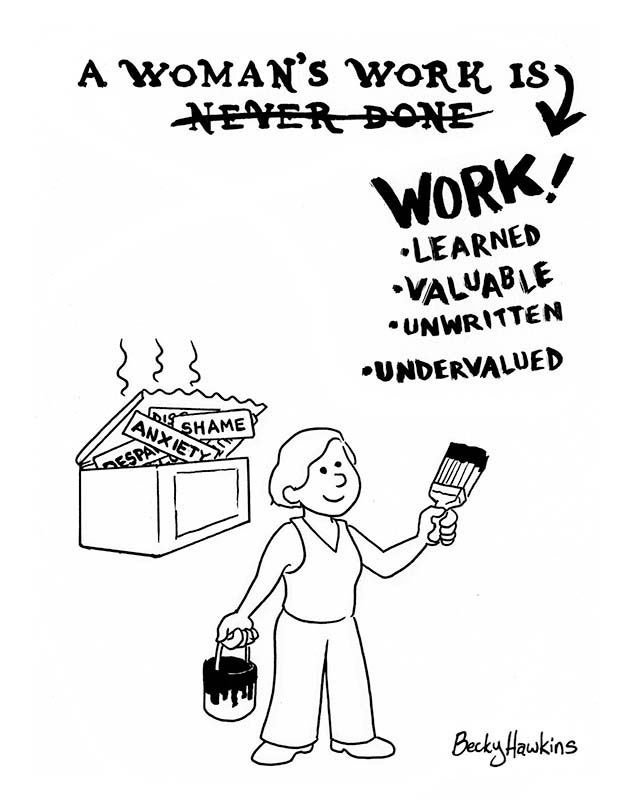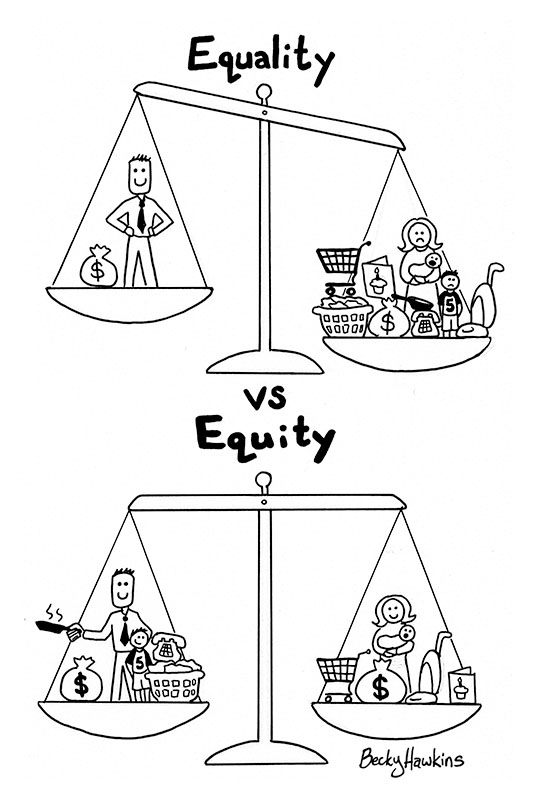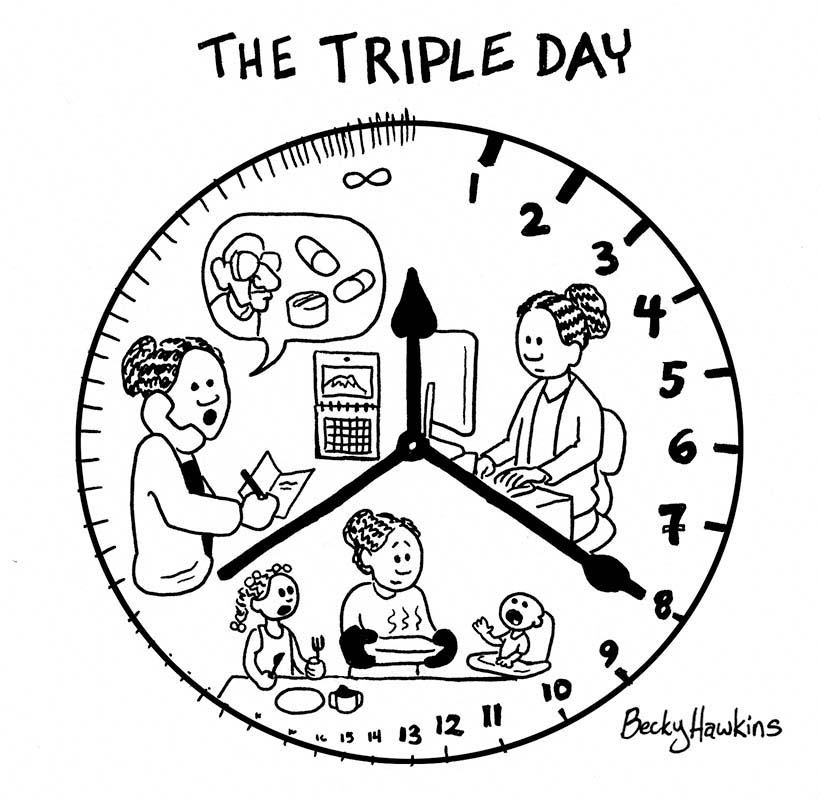EMOTIONAL
LABOR
Unseen and Unspoken: Disrupting the Narrative of Household Management
10 Learning Outcomes
- Understand the Concept of Emotional Labor: Participants will gain a comprehensive understanding of what emotional labor entails, including its historical context and modern implications.
- Recognize Diverse Household Structures: Audience members will understand the work of emotional labor through a variety of household configurations, including single-parent families and non-traditional living arrangements.
- Regard the Impact of Historical Narratives on Modern Expectations: The audience will learn about the historical context of “women’s work” and how the intergenerational nature of these narratives continue to influence modern household dynamics.
- Manage the Mental Load of Emotional Labor: Participants will gain insights into the invisible cognitive work involved in household management and strategies to manage this mental load effectively.
- Consider Executive Function Skills in Household Management: Participants will recognize that the skills required for effective household management are similar to those needed in professional settings, such as planning, processing, and prioritizing.
- Change the Narrative of so-called women’s work: The audience will learn key components to changing how we comprehend the roles and responsibilities of everyone in the household.
- Identify and Addressing the Challenges toward Change: Audience members will learn to recognize tendencies toward control, and the concept weaponized incompetence, and how addressing will minimize the impact on household management.
- Develop the Practice of Radical Delegation: Participants will learn the concept of radical delegation – and its usefulness in creating a division of labor in household management.
- Plan for the Emotional Labor Lifecycle: Participants will develop skills to anticipate and prepare for future household and family needs, ensuring a proactive approach to managing emotional labor.
- Acquire Strategies for Gender Equality in the Workplace: When participants recognize the substance of gender equality at home; they can apply new skills to workplace environment.


TIME MANAGEMENT
Clear Space, Clear Mind: Unpacking the Burden of Clutter
10 Learning Outcomes
- Acknowledge the Emotional and Physical Impact of Clutter: Comprehend how clutter can emotionally and physically burden individuals, affecting their well-being.
- Differentiate Your Needs, Wants, and Values: Learn to identify the differences between needs, wants, and values, and how these distinctions can help in decluttering.
- Understand the Role of Your Brain’s Executive Functions: The audience will learn how and why we can cognitively control our environment, and how weakness in these skills can lead to a poor relationship with time, emotions, and our stuff.
- Strategies for Resolving Excessive Clutter: Analyze various strategies for helping clients address and resolve their issues with having too much stuff.
- Psychic Debris and Negative Thinking: Understand the concept of psychic debris and how negative thinking can impede personal growth and clutter management.
- Origins of Clutter and Psychic Debris: Explore the sources of physical clutter and psychic debris, including environmental, childhood influences, and self-perception.
- Identify When Possessions Become Clutter: Learn to recognize when possessions have become clutter due to being homeless, no longer useful, or broken.
- Implement SMART Goals for Decluttering: Apply the principles of SMART (Specific, Measurable, Attainable, Result-Oriented, Time-Related) goals to the process of decluttering.
- The Role of Positive Affirmations: Understand the importance and practice of positive affirmations in maintaining a clear mind and organized space.
- Long-term Maintenance of Clutter-free Environments: Develop techniques for maintaining clutter-free environments, including mind mapping, acting immediately, informing others, nurturing oneself, and investing in support systems.


CLUTTER
A Clear Path: My Journey into Junk
10 Learning Outcomes
- Understand the Link Between Clutter and Mental Health: Comprehend how physical clutter can reflect and affect mental well-being, and the importance of addressing both for overall health.
- Role of Professional Organizers: Gain insights into the responsibilities and impact of professional organizers in helping clients manage their spaces and mental states.
- Entrepreneurial Skills in Niche Markets: Learn the basics of starting and growing a business in a specialized field, including marketing, networking, and client relations.
- Emotional and Psychological Aspects of Clutter: Explore the emotional connections people have with their possessions and the challenges they face in letting go.
- Adaptability in Career Paths: Understand the importance of adaptability and resilience when transitioning from an academic or traditional career to an entrepreneurial venture.
- Practical Organizing Techniques: Learn practical tips and strategies for organizing spaces, especially for clients with severe clutter or hoarding tendencies.
- Professional Growth and Credential Utilization: Recognize the value of leveraging academic credentials and continuous learning in new professional contexts.
- Client Management and Communication: Develop skills in effectively communicating with and managing clients, particularly those with specific psychological or emotional needs related to clutter.
- Balancing Professional and Personal Identities: Reflect on how personal experiences and background can influence and enhance professional practices and relationships.
- Impact of Physical Environment on Productivity: Understand how a well-organized physical environment can enhance productivity and quality of life for individuals.

All Topics
What Is “Woman’s Work” And Why Is It Never Done?
Regina examines the historical underpinnings for “a woman’s work” and provides strategies to disrupt the narrative.
The Emotional Labor Cupcake
Baking cupcakes for your child’s school project involves more than mixing up a batch. It’s planning, processing, sequencing — from idea to oven to school — and involving your child! Regina explores reasons for looking at all functions and tasks of the household through the lens of project management and delegation.
Nag, Bitch, Shrew: The Emotional Labor Of The Perpetual Ask
If you asked once, you’ve asked 100 times, and now … you’re a nag. What is it about “the ask” that turns “please wash your cup” into a full-blown argument? Regina suggests that a woman’s work is never done because others in the household aren’t doing their share. She discusses why listening and noticing are skills everyone in the home could adopt as their own.
“I Had No Idea It Would Be So Much Work!”: The Emotional Labor Lifecycle
What if you had a template that would highlight ALL the labor that goes into developing our relationship to emotional labor? Regina introduces the concept of the “emotional labor lifecycle” to help young couples and established families identify, navigate and delegate work.
Uplift And Elevate: Reimagining The Sisterhood
In the 1960s, Betty Friedan called it “the problem with no name.” Today, we call it “emotional labor.” Women’s bodies and brains are being crushed under its weight, and we think we’re the only ones experiencing the heaviness of it all. Regina makes the case for reimagining our sisterhood and why developing these relationships can be so damn powerful.
Emotional Labor: Why A Woman’s Work is Never Done and What to Do About It
Regina examines women’s relationship to emotional labor throughout history (including the COVID-19 era) and provides actionable steps to change the narrative.
Living Fearlessly: Conceive, Believe, Achieve
Regina offers a new way for you to look at your life and the things you do with curiosity and compassion.
About Senior Solutions
Serves the needs of aging seniors and families: Visionary Aging With Regina Lark.
Sample Topics & Areas Of Expertise

Emotional Labor: Why a Woman’s Work Is Never Done and What To Do About It
Regina examines women’s relationship to emotional labor throughout history (including the COVID-19 era) and provides actionable steps to change the narrative.
Living Fearlessly: Conceive, Believe, Achieve
Regina offers a new way for you to look at your life and the things you do with curiosity and compassion.

